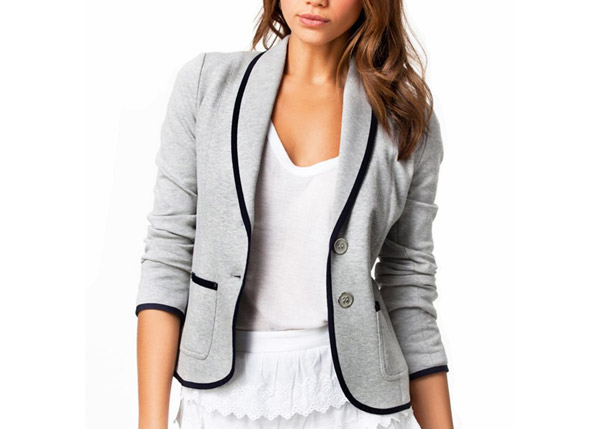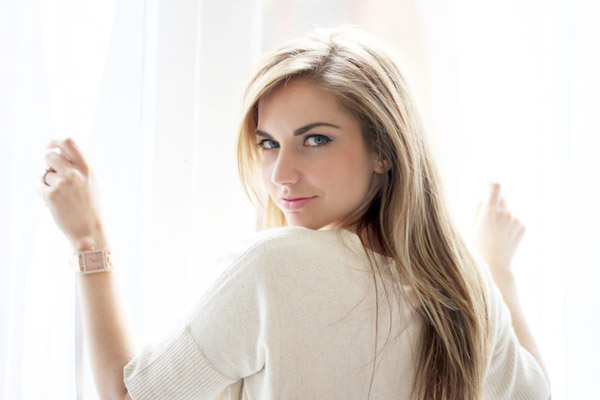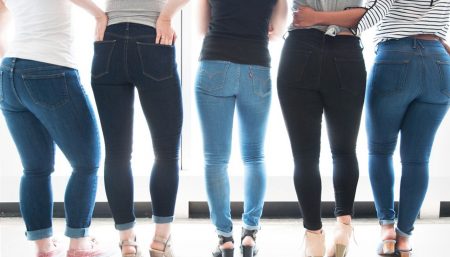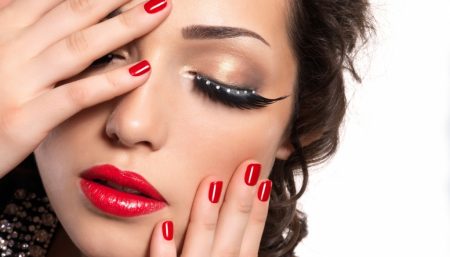
Shape and silhouette are one thing, but then we all have our niggling little quirks that require further advice and fine-tuning.
Check out the following tips for specific camouflaging challenges to help you achieve the most natural looking effect possible and gain confidence and self-esteem in the process:
 NECK
NECK
Long (and/or Thin) neck:
- If the length of your neck bothers you, fill in the space by wearing a hairstyle that ends mid-way down your neck. Use chokers, scarves and roll-neck tops to ‘shorten’ length.
- If your neck is thin as well as long, add ‘bulk’ by layering, such as a roll neck under a classic collar. Wear a cravat inside your blouses.
- Mandarin collars on jackets are particularly good.
Short (and/or thick) neck:
- Always wear an open neckline.
- A V-neck top creates an illusion of a longer, slimmer neck.
- Wear a fine chain below the collar bone; longer chains are even more slimming/elongating.
- Stand up collars at the back of the neck, and open them low in front.
- Oblong scarves tied low are better than squares tied high in the neck area.
- Collarless jackets are good but avoid styles that button high.

 SHOULDER
SHOULDER
Wide/broad shoulders:
- Softly tailored designs are better than structured jackets with set-in sleeves and define, padded shoulders.
- Jacket piping or trimmed lapels make the shoulders appear narrower.
- Raglan sleeves soften the broadness.
- V-neck and open collars are better than high buttoning.
- For evening wear and swimsuits, the halter neckline is particularly good.
- If your neck is long enough, wear choker styles to draw attention inwards.
Narrow/sloping shoulders:
- Avoid tight-fitting, skimpy tops.
- Layer on the top, for example a loose shirt over a body suit.
- Wear shoulder pads with most things. Try various shape to get right definition/softness for your overall look. Update the shape of your shoulder pads with changing the fashion trends (though not every season).
- Horizontal effects create a widening illusion, for example a scarf worn across the shoulders, epaulettes on jackets and dresses, strip in tops, and wide crew necklines.
- Shoulder details in the form of pleating or gathers is a good idea, for example leg-of-mutton-sleeves.
- For evening wear and swimsuits, avoid strapless or halter designs in favour of thick straps that angle from the cleavage to the shoulder (that is, the reverse of the halter).
- Wear brooches and pins outside lapels.
 BUST
BUST
Small bust:
- Make the most of what you have got with a good bra that creates shape (avoid sports bras in favour of slightly padded styles).
- Looser tops will make you appear larger.
- Layer on top (T-shirt under shirt then a jacket over).
- Wear scarves (neck permitting) inside the neck of your blouses.
- Short sleeves ‘widen’ the bust area.
- Use texture and pattern in your blouses and jackets.
- Select jackets and blouses with pockets.
- Empire waistlines accentuate any bust.
- For evening, avoid skimpy fitted styles on top in favour of more substantial fabrics (satin, raw silk) and tailoring.
Full bust:
- Open necklines are best.
- Use softer fabrics in blouses.
- Go for loose not tight-fitting tops.
- Look for minimal detailing in blouses and jackets.
- Matte and plain fabrics are more elegant.
- Necklaces and scarves should end above the fullest point of the bustline.
- Avoid very cinched waists.
- Soft, tie belts or no belts are best.
- A properly fitted bra is essential. Don’t hike them too high or let them sag too low.
- Avoid layering (which adds bulk), unless in fine fabrics.
- For evening, either go sleeveless or wear long sleeves.

 WAIST
WAIST
Long waist/torso:
- Wear short jackets (if bust allows) or else long jackets with short shirts.
- Play up the waist area with belts and detailing.
- High-waisted skirts and trousers are great avoid hipsters.
- Use colour and pattern in the top (blouses, jackets) and keep the bottom neutral (skirts, trousers).
- Avoid drop-waisted designs in favour of empire styles.
Short waist/torso:
- Wear longer-line jackets and blouses.
- Have only modest detailing at the waist, such as slightly fitted jackets and dresses; no belt tight at the waist.
- Wear thin belt and chains low over hips rather than tight at the waist.
- Oblong scarves will ‘lengthen’ your top.
- Layer tops over body suits.
- Wear blouses slightly eased out of your waistline.
Narrow waist:
- Show it off with belts and fitted designs.
- If it is too narrow, layer on top to create more bulk over blouses, sweaters, and jackets.
- Waistcoats worn open create more width, preventing you from looking too gaunt at the same time as allowing us to peek at your enviable waistline.
Wide/full waist:
- If your waist is fuller than your bust or your hips have no emphasis at all at the waist, wear long tops, loose over-blouses, and simple, shift dresses.
- If you are just broad at the waist, wear thin belts or belts of the same colour as the top.
- Or wear belts below the waistline, Over the hips.
- Single-breasted jackets are more slimming than double-breasted.
- Avoid fluffy or shiny fabrics on top.
- Oblong scarves will create a slimming illusion in front.

 ARMS
ARMS
Skinny arms:
- Choose slightly loose but not baggy sleeves.
- Wear layered tops, for example, bodysuits under shirts.
- Textured jackets and bulky sweaters are good.
- Short sleeves, blouses, and tops with pockets all make you appear fuller.
- For the evening, wear blouses and jackets in substantial, not flimsy, fabrics.
Flabby arms:
- Set-in sleeves and slightly padded shoulders create balance at the shoulder for full arms.
- Avoid tight-fitting sleeves in stretch jerseys or Lycra.
- Short sleeves should end below the widest point; just above the elbow is flattering.
- For the evening, sheer sleeves (slightly loose) are great.
- When sleeveless, consider draping a stole, wrap or scarf over your shoulders and arms.
 BOTTOM AND THIGH
BOTTOM AND THIGH
Flat bottom and thin thighs:
- Fitted jackets that flare slightly over the hips (peplums) are good for you.
- Shirt or jacket pockets at the hips add welcome bulk.
- Dropped waistlines in skirts and gathered styles are both good options.
- Team short jackets with short skirts, preferably not matching, for example, a plain jacket with a patterned or textured skirt.
- Try jackets and tops that belt or tie at the back.
- Wear loose waistcoats.
- Look for stiff or bulky fabrics in skirts and trousers, such as leather, corduroy, knits, and linen.
- Plated skirts suit you.
- Wear chunky belts low over the hips; best of all over blouses or sweaters.
- Carry a bum bag!
Full bottom and thighs:
- Build up the top to balance the bottom. Wear loose-fitting jackets and tops; use layering; and always wear shoulder pads.
- Keep the interest on top with colour and texture, and keep the bottom plain, matte and dark.
- Avoid stiff or bulky fabrics in shirts or trousers.
- Get the fit over thighs, hips and bottom right (namely, easy) and take in the waist if necessary.
- Have jackets and tops end above or below the fullest point in the hips.
- Gathers in skirts and trousers are necessary but avoid styles that add volume. Minimal gathers over the hips are more slimming than waistline completely gathered.
- Elasticated waists with knife pleating are great in skirts.
- Avoid straight or A-line skirts in favour of styles that drape and move (for example cut of the bias, wrap-over, slitted).
- Reject turn-ups and trousers or flares in favour of tapered or straight cuts.
- Your shortest skirts should end just above or just below the knee. For long styles, go just below mid-calf (tea length) and show a bit of leg.
- A slight heel will left your stature and minimize your bottom.
- Avoid very tight jeans or trousers. With stirrups or legging wear long easy tops.
- If you have a nice waist, show it off with fitted jackets and tops. But be careful not to accentuate the hips with very cinched waists.
- Control-top tights work wonders but try not to become dependent or restrictive undergarments (like girdles) because they inhibit circulation, make muscles flabby and encourage the build-up of toxins (the dreaded cellulite).
Disclaimer
The Content is not intended to be a substitute for professional medical advice, diagnosis, or treatment. Always seek the advice of your physician or other qualified health provider with any questions you may have regarding a medical condition.


